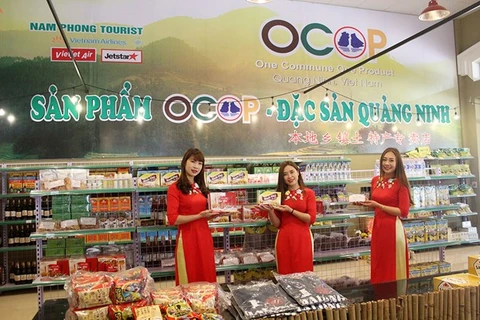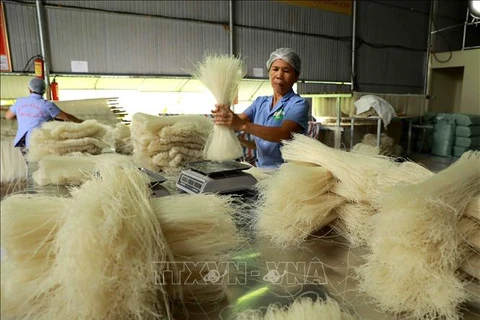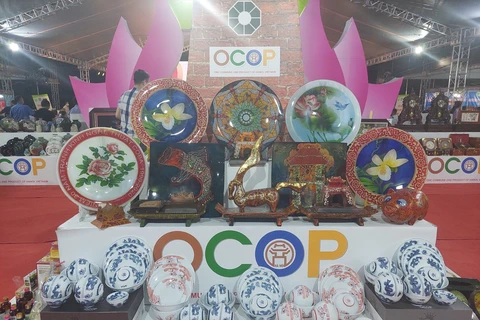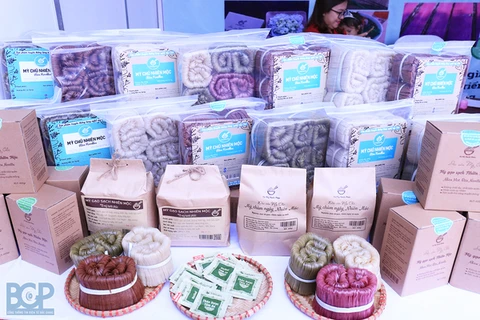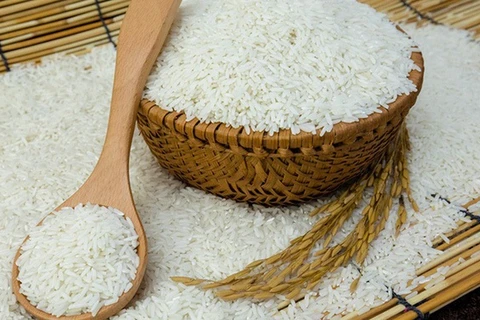 A week-long event to introduce and sell goods within the framework of the ‘One Commune, One Product’ (OCOP) programme kicks off on September 29 evening at the centre of culture, information and sports of Hanoi’s Thanh Tri district. The event is organised by the municipal coordinating office for the new-style rural area building programme of Hanoi. The OCOP fair aims to help with the promotion, trade and sales of local products. The event will also help to develop the rural economy based on increasing application of digital transformation technology, boosting the growth of a circular economy, and enhancing rural people’s income and living standards, according to the organising board. (Photo: VietnamPlus)
A week-long event to introduce and sell goods within the framework of the ‘One Commune, One Product’ (OCOP) programme kicks off on September 29 evening at the centre of culture, information and sports of Hanoi’s Thanh Tri district. The event is organised by the municipal coordinating office for the new-style rural area building programme of Hanoi. The OCOP fair aims to help with the promotion, trade and sales of local products. The event will also help to develop the rural economy based on increasing application of digital transformation technology, boosting the growth of a circular economy, and enhancing rural people’s income and living standards, according to the organising board. (Photo: VietnamPlus)  There are about 70 stalls introducing OCOP items from different regions and areas nationwide. OCOP goods are highly localised products, often food, that comes from one specific area. The week-long event to introduce and sell goods under the OCOP programme is held by the municipal coordinating office for the new-style rural area building programme of Hanoi. The OCOP programme was initiated by the Ministry of Agriculture and Rural Development in 2008, based on Japan’s “One Village, One Product” and Thailand’s “One Tambon, One Product” programmes. In the photo, a stall is displaying products from Son Tay town on the outskirts of Hanoi. (Photo: VietnamPlus)
There are about 70 stalls introducing OCOP items from different regions and areas nationwide. OCOP goods are highly localised products, often food, that comes from one specific area. The week-long event to introduce and sell goods under the OCOP programme is held by the municipal coordinating office for the new-style rural area building programme of Hanoi. The OCOP programme was initiated by the Ministry of Agriculture and Rural Development in 2008, based on Japan’s “One Village, One Product” and Thailand’s “One Tambon, One Product” programmes. In the photo, a stall is displaying products from Son Tay town on the outskirts of Hanoi. (Photo: VietnamPlus)  The ‘One Commune, One Product’ (OCOP) programme was initiated by the Ministry of Agriculture and Rural Development in 2008. It is an economic development programme for rural areas and also to help implement the national target programme on building new-style rural areas. OCOP products are made based on the combination of local resources, traditional culture, and advanced technology, thus promoting product diversification, quality, packaging, and origin traceability. The programme has provided farmers with a chance to come together to form cooperatives. This has, in turn, enabled farmers to create goods with better quality, design, and packaging that meet higher standards and match market demand. (Photo: VietnamPlus)
The ‘One Commune, One Product’ (OCOP) programme was initiated by the Ministry of Agriculture and Rural Development in 2008. It is an economic development programme for rural areas and also to help implement the national target programme on building new-style rural areas. OCOP products are made based on the combination of local resources, traditional culture, and advanced technology, thus promoting product diversification, quality, packaging, and origin traceability. The programme has provided farmers with a chance to come together to form cooperatives. This has, in turn, enabled farmers to create goods with better quality, design, and packaging that meet higher standards and match market demand. (Photo: VietnamPlus)  A stall introduces dried pork and buffalo meat from the northern mountainous provinces of Yen Bai and Ha Giang. The OCOP programme, initiated by the Ministry of Agriculture and Rural Development in 2008, is an economic development programme for rural areas and also to help implement the national target programme to build new-style rural areas. OCOP products are made based on the combination of local resources, traditional culture, and advanced technology. The programme promotes product diversification, quality, packaging, and origin traceability. It looks to have at least 10,000 products nationwide by 2025, and serves as a focus of economic development efforts in rural areas and also a crucial task in the implementation of the national target programme on new-style countryside building for 2021 - 2025. (Photo: VietnamPlus)
A stall introduces dried pork and buffalo meat from the northern mountainous provinces of Yen Bai and Ha Giang. The OCOP programme, initiated by the Ministry of Agriculture and Rural Development in 2008, is an economic development programme for rural areas and also to help implement the national target programme to build new-style rural areas. OCOP products are made based on the combination of local resources, traditional culture, and advanced technology. The programme promotes product diversification, quality, packaging, and origin traceability. It looks to have at least 10,000 products nationwide by 2025, and serves as a focus of economic development efforts in rural areas and also a crucial task in the implementation of the national target programme on new-style countryside building for 2021 - 2025. (Photo: VietnamPlus)  Typical farm produce from the northwestern mountainous province of Dien Bien such as Seng Cu rice, natural mushrooms, and bamboo shoots are on display at the two-week event to introduce and sell goods under the OCOP programme. The event which kicks off on September 27 is held by the municipal coordinating office for the new-style rural area building programme of Hanoi. The OCOP fair aims to help with the promotion, trade and sales of local products; and to develop the rural economy based on increasing the application of digital transformation technology, boosting the growth of a circular economy, and enhancing rural people’s income and living standards. (Photo: VietnamPlus)
Typical farm produce from the northwestern mountainous province of Dien Bien such as Seng Cu rice, natural mushrooms, and bamboo shoots are on display at the two-week event to introduce and sell goods under the OCOP programme. The event which kicks off on September 27 is held by the municipal coordinating office for the new-style rural area building programme of Hanoi. The OCOP fair aims to help with the promotion, trade and sales of local products; and to develop the rural economy based on increasing the application of digital transformation technology, boosting the growth of a circular economy, and enhancing rural people’s income and living standards. (Photo: VietnamPlus)  The northern mountainous province of Ha Giang brings its typical agricultural products such as mint honey, dried jujube, tam that (Himalayan ginseng) and its flower buds to the fair. OCOP products are made based on the combination of local resources, traditional culture, and advanced technology, thus promoting product diversification, quality, packaging, and origin traceability. The OCOP programme, initiated by Ministry of Agriculture and Rural Development in 2008, has provided farmers with a chance to come together to form cooperatives. These have, in turn, enabled farmers to create goods with better quality, design, and packaging that meet higher standards and match market demand. (Photo: VietnamPlus)
The northern mountainous province of Ha Giang brings its typical agricultural products such as mint honey, dried jujube, tam that (Himalayan ginseng) and its flower buds to the fair. OCOP products are made based on the combination of local resources, traditional culture, and advanced technology, thus promoting product diversification, quality, packaging, and origin traceability. The OCOP programme, initiated by Ministry of Agriculture and Rural Development in 2008, has provided farmers with a chance to come together to form cooperatives. These have, in turn, enabled farmers to create goods with better quality, design, and packaging that meet higher standards and match market demand. (Photo: VietnamPlus)  OCOP products are made based on the combination of local resources, traditional culture, and advanced technology, thus promoting product diversification, quality, packaging, and origin traceability. The OCOP programme, initiated by the Ministry of Agriculture and Rural Development in 2008, is an economic development programme for rural areas. It also helps to implement the national target programme on building new-style rural areas. The OCOP programme looks to have at least 10,000 products nationwide by 2025. It is a focus of economic development efforts in rural areas and also a crucial task in the implementation of the national target programme on new-style countryside building for 2021 - 2025. (Photo: VietnamPlus)
OCOP products are made based on the combination of local resources, traditional culture, and advanced technology, thus promoting product diversification, quality, packaging, and origin traceability. The OCOP programme, initiated by the Ministry of Agriculture and Rural Development in 2008, is an economic development programme for rural areas. It also helps to implement the national target programme on building new-style rural areas. The OCOP programme looks to have at least 10,000 products nationwide by 2025. It is a focus of economic development efforts in rural areas and also a crucial task in the implementation of the national target programme on new-style countryside building for 2021 - 2025. (Photo: VietnamPlus)  In addition to specialties from the mountainous areas, the fair also showcases products such as towels made from yarns imported from India. A week-long event to introduce and sell goods under the OCOP programme is being held in Hanoi by the municipal coordinating office for the new-style rural area building programme of Hanoi. So far, Hanoi has recognised 1,649 OCOP goods, including four rated five stars, 1,098 four stars, and 534 three stars. They include 1,071 food, 35 beverage, 17 herbal, 492 handicraft, and 34 fabric and apparel products. The capital city is taking the lead nationwide in terms of the number of OCOP products and five-star OCOP ones. (Photo: VietnamPlus)
In addition to specialties from the mountainous areas, the fair also showcases products such as towels made from yarns imported from India. A week-long event to introduce and sell goods under the OCOP programme is being held in Hanoi by the municipal coordinating office for the new-style rural area building programme of Hanoi. So far, Hanoi has recognised 1,649 OCOP goods, including four rated five stars, 1,098 four stars, and 534 three stars. They include 1,071 food, 35 beverage, 17 herbal, 492 handicraft, and 34 fabric and apparel products. The capital city is taking the lead nationwide in terms of the number of OCOP products and five-star OCOP ones. (Photo: VietnamPlus)  Phuc Trach grapefruit – a specialty of the central province of Ha Tinh, is also present at the week-long event to introduce and sell goods under the OCOP programme in Hanoi. The event, which kicks off on September 29, is held by the municipal coordinating office for the new-style rural area building programme of Hanoi. In 2022, the capital city plans to hold four events in different local districts to introduce OCOP products of not only the city but also other localities in the northern, central, Central Highlands, and southern regions. So far, Hanoi has recognised 1,649 OCOP goods, including four rated five stars, 1,098 four stars, and 534 three stars. (Photo: VietnamPlus)
Phuc Trach grapefruit – a specialty of the central province of Ha Tinh, is also present at the week-long event to introduce and sell goods under the OCOP programme in Hanoi. The event, which kicks off on September 29, is held by the municipal coordinating office for the new-style rural area building programme of Hanoi. In 2022, the capital city plans to hold four events in different local districts to introduce OCOP products of not only the city but also other localities in the northern, central, Central Highlands, and southern regions. So far, Hanoi has recognised 1,649 OCOP goods, including four rated five stars, 1,098 four stars, and 534 three stars. (Photo: VietnamPlus)  Health products are made from fresh Vietnamese garlic, manufactured under Japanese technology lines. The product is rated four stars at the event. The week-long event to introduce and sell goods under the OCOP programme in Hanoi is being held by the municipal coordinating office for the new-style rural area building programme of Hanoi. The capital has so far recognised 1,649 OCOP goods, including four rated five stars, 1,098 four stars, and 534 three stars. By 2025, Hanoi looks to have an additional 2,000 OCOP products rated at least three stars. All the communes that meet advanced criteria of the new-style rural area building programme have OCOP products, and at least 70% of OCOP product makers being cooperatives, cooperative groups and businesses. (Photo: VietnamPlus)
Health products are made from fresh Vietnamese garlic, manufactured under Japanese technology lines. The product is rated four stars at the event. The week-long event to introduce and sell goods under the OCOP programme in Hanoi is being held by the municipal coordinating office for the new-style rural area building programme of Hanoi. The capital has so far recognised 1,649 OCOP goods, including four rated five stars, 1,098 four stars, and 534 three stars. By 2025, Hanoi looks to have an additional 2,000 OCOP products rated at least three stars. All the communes that meet advanced criteria of the new-style rural area building programme have OCOP products, and at least 70% of OCOP product makers being cooperatives, cooperative groups and businesses. (Photo: VietnamPlus)  Fried paste cuttlefish is made manually, using the fish from Ha Long Bay, the northeastern province of Quang Ninh. According to local data, Quang Ninh now has more than 500 products developed by 189 companies, cooperatives and production facilities under the “One Commune, One Product” (OCOP) programme. By 2025, the province is set to have developed 300 new OCOP products, at least 250 of which will be rated from three to five stars. The Hanoi coordinating office for the new-style rural area building programme is organising a week-long event to introduce and sell goods under the OCOP programme at the centre of culture, information and sports of Hanoi’s Thanh Tri district. (Photo: VietnamPlus)
Fried paste cuttlefish is made manually, using the fish from Ha Long Bay, the northeastern province of Quang Ninh. According to local data, Quang Ninh now has more than 500 products developed by 189 companies, cooperatives and production facilities under the “One Commune, One Product” (OCOP) programme. By 2025, the province is set to have developed 300 new OCOP products, at least 250 of which will be rated from three to five stars. The Hanoi coordinating office for the new-style rural area building programme is organising a week-long event to introduce and sell goods under the OCOP programme at the centre of culture, information and sports of Hanoi’s Thanh Tri district. (Photo: VietnamPlus)  Phan Thiet fish sauce – a specialty of the southcentral province of Binh Thuan is made of fresh com fish (achovy). The product is rated four stars. Phan Thiet city opened the country’s first fish sauce museum introducing the history of the local fish sauce making industry. Covering 2,000sq.m, the museum consists of 14 exhibition spaces that reenact changes in the Phan Thiet fishing village over 300 years. The facility is a highlight of Phan Thiet’s ancient fishing village project, which also includes a theatre and an area for local specialties. Built at a cost of approximately 100 billion VND (4.27 million USD) and covering10,000 sq.m, the project saw its construction beginning in 2017 and completed in late May 2019. (Photo: VietnamPlus)
Phan Thiet fish sauce – a specialty of the southcentral province of Binh Thuan is made of fresh com fish (achovy). The product is rated four stars. Phan Thiet city opened the country’s first fish sauce museum introducing the history of the local fish sauce making industry. Covering 2,000sq.m, the museum consists of 14 exhibition spaces that reenact changes in the Phan Thiet fishing village over 300 years. The facility is a highlight of Phan Thiet’s ancient fishing village project, which also includes a theatre and an area for local specialties. Built at a cost of approximately 100 billion VND (4.27 million USD) and covering10,000 sq.m, the project saw its construction beginning in 2017 and completed in late May 2019. (Photo: VietnamPlus)  The four-star Phan Thiet fish sauce is a product introduced at a fair in Hanoi. The week-long event to introduce and sell goods under the OCOP programme is being held by the Hanoi coordinating office for the new-style rural area building programme at the centre of culture, information and sports of Thanh Tri district. The OCOP programme, initiated by the Ministry of Agriculture and Rural Development in 2008, is an economic development programme for rural areas and also to help implement the national target programme on new-style rural area building. The OCOP programme looks to have at least 10,000 products nationwide by 2025. (Photo: VietnamPlus)
The four-star Phan Thiet fish sauce is a product introduced at a fair in Hanoi. The week-long event to introduce and sell goods under the OCOP programme is being held by the Hanoi coordinating office for the new-style rural area building programme at the centre of culture, information and sports of Thanh Tri district. The OCOP programme, initiated by the Ministry of Agriculture and Rural Development in 2008, is an economic development programme for rural areas and also to help implement the national target programme on new-style rural area building. The OCOP programme looks to have at least 10,000 products nationwide by 2025. (Photo: VietnamPlus)  The event to introduce and sell goods under the OCOP programme is taking place from September 27 to October 2 at the centre of culture, information and sports of Hanoi’s Thanh Tri district. The OPOC fair aims to help with the promotion, trade and sales of local products. It will also help to develop the rural economy based on increasing application of digital transformation technology, boosting the growth of a circular economy, and enhancing rural people’s income and living standards. OCOP goods are highly localised products, often food, that come from one specific region. The capital has so far recognised 1,649 OCOP goods, including four products rated five stars, 1,098 others rated four stars, and 534 rated three stars. (Photo: VietnamPlus).
The event to introduce and sell goods under the OCOP programme is taking place from September 27 to October 2 at the centre of culture, information and sports of Hanoi’s Thanh Tri district. The OPOC fair aims to help with the promotion, trade and sales of local products. It will also help to develop the rural economy based on increasing application of digital transformation technology, boosting the growth of a circular economy, and enhancing rural people’s income and living standards. OCOP goods are highly localised products, often food, that come from one specific region. The capital has so far recognised 1,649 OCOP goods, including four products rated five stars, 1,098 others rated four stars, and 534 rated three stars. (Photo: VietnamPlus). VNA
